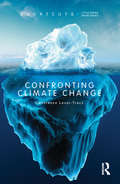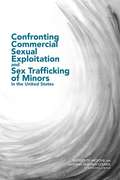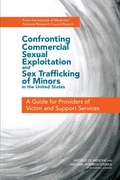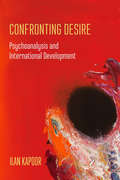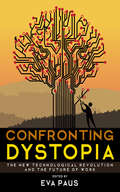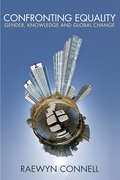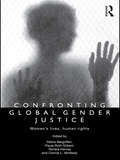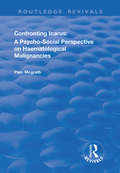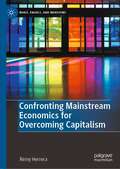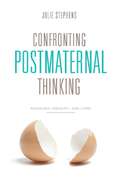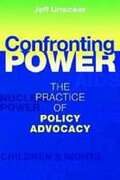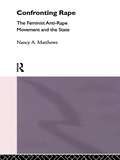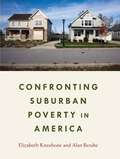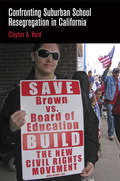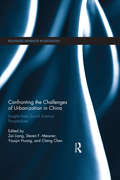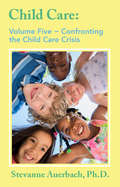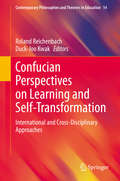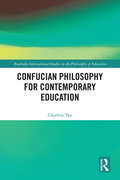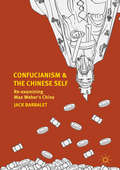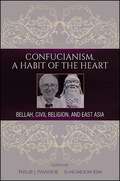- Table View
- List View
Confronting Climate Change (Shortcuts)
by Constance Lever-TracyWhat are the manifest and likely future consequences of climate change? How will the world respond to the challenges of climate change in the twenty-first century? How should people think about confronting the politics of climate change? In this highly accessible introduction to the predicted global impacts of climate change, Constance Lever-Tracy provides an authoritative guide to one of the most controversial issues facing the future of our planet. Discussing how the social and natural sciences must work together more effectively in confronting climate change, Lever-Tracy provides a sober, critical assessment of the politics of global warming and climate change. By combining sociology, environmental studies and politics, Confronting Climate Change will serve as an introduction that will appeal to students and general readers alike.
Confronting Commercial Sexual Exploitation and Sex Trafficking of Minors in the United States
by Institute of Medicine National Research Council Board on Children, Youth, and Families Committee on Law and Justice Ellen Wright Clayton Richard D. Krugman Committee on the Commercial Sexual Exploitation and Sex Trafficking of Minors in the United States Patti SimonEvery day in the United States, children and adolescents are victims of commercial sexual exploitation and sex trafficking. Despite the serious and long-term consequences for victims as well as their families, communities, and society, efforts to prevent, identify, and respond to these crimes are largely under supported, inefficient, uncoordinated, and unevaluated. Confronting Commercial Sexual Exploitation and Sex Trafficking of Minors in the United States examines commercial sexual exploitation and sex trafficking of U.S. citizens and lawful permanent residents of the United States under age 18. According to this report, efforts to prevent, identify, and respond to these crimes require better collaborative approaches that build upon the capabilities of people and entities from a range of sectors. In addition, such efforts need to confront demand and the individuals who commit and benefit from these crimes. The report recommends increased awareness and understanding, strengthening of the law's response, strengthening of research to advance understanding and to support the development of prevention and intervention strategies, support for multi-sector and interagency collaboration, and creation of a digital information-sharing platform. A nation that is unaware of these problems or disengaged from solutions unwittingly contributes to the ongoing abuse of minors. If acted upon in a coordinated and comprehensive manner, the recommendations of Confronting Commercial Sexual Exploitation and Sex Trafficking of Minors in the United States can help advance and strengthen the nation's emerging efforts to prevent, identify, and respond to commercial sexual exploitation and sex trafficking of minors in the United States.
Confronting Commercial Sexual Exploitation and Sex Trafficking of Minors in the United States: A Guide for Providers of Victim and Support Services
by Institute of MedicineCommercial sexual exploitation and sex trafficking of minors in the United States are frequently overlooked, misunderstood, and unaddressed domestic problems. In the past decade, they have received increasing attention from advocates, the media, academics, and policy makers. However, much of this attention has focused internationally. This international focus has overshadowed the reality that commercial sexual exploitation and sex trafficking of minors also occur every day within the United States. Commercial sexual exploitation and sex trafficking of minors not only are illegal activities, but also result in immediate and long-term physical, mental, and emotional harm to victims and survivors. A nation that is unaware of these problems or disengaged from solving them unwittingly contributes to the ongoing abuse of minors and all but ensures that these crimes will remain marginalized and misunderstood. The 2013 Institute of Medicine and the National Research Council report Confronting Commercial Sexual Exploitation and Sex Trafficking of Minors in the United States increases awareness and understanding of the crucial problem of commercial sexual exploitation and sex trafficking of minors in the United States. By examining emerging strategies for preventing and identifying these crimes, for assisting and supporting victims and survivors, and for addressing exploiters and traffickers, that report offers a path forward through recommendations designed to increase awareness and understanding and to support efforts to prevent, identify, and respond to these crimes. Confronting Commercial Sexual Exploitation and Sex Trafficking of Minors in the United States: A Guide for Providers of Victim and Support Services offers a more concise and focused perspective on the problem and emerging solutions for providers of victim and support services for children and adolescents. These service providers include policy makers, leaders, practitioners, organizations, and programs at the local, state, and federal levels. This guide will be a valuable resource for them, and for child welfare and child protective services, other agencies and programs within the state and federal governments (e. g. , the U. S. Department of Justice's Office for Victims of Crime), and nongovernmental organizations.
Confronting Desire: Psychoanalysis and International Development
by Ilan KapoorBy applying psychoanalytic perspectives to key themes, concepts, and practices underlying the development enterprise, Confronting Desire offers a new way of analyzing the problems, challenges, and potentialities of international development. Ilan Kapoor makes a compelling case for examining development's unconscious desires and in the process inaugurates a new field of study: psychoanalytic development studies.Drawing from the work of Jacques Lacan and Slavoj Žižek, as well as from psychoanalytic postcolonial and feminist scholarship, Kapoor analyzes how development's unconscious desires "speak out," most often in excessive and unpredictable ways that contradict the outwardly rational declarations of its practitioners. He investigates development's many irrationalities—from obsessions about growth and poverty to the perverse seductions of racism and over-consumption. By deploying key psychoanalytic concepts—enjoyment, fantasy, antagonism, fetishism, envy, drive, perversion, and hysteria—Confronting Desire critically analyzes important issues in development—growth, poverty, inequality, participation, consumption, corruption, gender, "race," LGBTQ politics, universality, and revolution. Confronting Desire offers prescriptions for applying psychoanalysis to development theory and practice and demonstrates how psychoanalysis can provide fertile ground for radical politics and the transformation of international development.
Confronting Dystopia: The New Technological Revolution and the Future of Work
by Eva PausIn Confronting Dystopia, a distinguished group of scholars analyze the implications of the ongoing technological revolution for jobs, working conditions, and income. Focusing on the economic and political implications of AI, digital connectivity, and robotics for both the Global North and the Global South, they move beyond diagnostics to seek solutions that offer better lives for all. Their analyses of the challenges of technology are placed against the backdrop of three decades of rapid economic globalization. The two in tandem are producing the daunting challenges that analysts and policymakers must now confront.The conjuncture of recent advances in AI, machine learning, and robotization portends a vast displacement of human labor, argues the editor, Eva Paus. As Confronting Dystopia shows, we are on the eve of—indeed we are already amid—a technological revolution that will impact profoundly the livelihoods of people everywhere in the world.Across a broad and deep set of topics, the contributors explore whether the need for labor will inexorably shrink in the coming decades, how pressure on employment will impact human well-being, and what new institutional arrangements—a new social contract, for example, will be needed to sustain livelihoods. They evaluate such proposals as a basic income, universal social services, and investments that address key global challenges and create new jobs.Contributors:Vandana Chandra, Mignon Duffy, Dieter Ernst, Vincent Ferraro, Martin Ford, Juliana Martinez Franzoni, Irmgard Nubler, Robert Pollin, David Rueda, Diego Sanchez-Ancochea, Guy Standing, Stefan Thewissen
Confronting Equality: Gender, knowledge and global change
by Raewyn ConnellWhat does social equality mean now, in a world of markets, global power and new forms of knowledge?In Confronting Equality Raewyn Connell combines vivid research with theoretical insight and radical politics to address this question. The focus moves across family change, class and education, intellectual workers, and the global dimension of social science, to contemporary theorists of knowledge and global power, and the political dilemmas of today's left. Written with clarity and passion, the book proposes a bold agenda for social science, and shows it in action.Raewyn Connell is known internationally for her powerfully argued and field-defining books Masculinities, Gender and Power, Making the Difference, and Southern Theory. This new volume gathers together a broad spectrum of her recent work which distinctively combines close-focus field research and large-scale theory. It brings this to bear on those questions of social justice and struggles for change that have long been at the heart of her writing, and will have wide-ranging implications for the social sciences and social activism in the twenty-first century.'[This is] social science at its best: characterised by richly theorised empirical research, and carving out a place for a radically generative and engaged world sociology.' - Professor Michael A. Messner, University of Southern California
Confronting Global Gender Justice: Women’s Lives, Human Rights
by Debra BergoffenConfronting Global Gender Justice contains a unique, interdisciplinary collection of essays that address some of the most complex and demanding challenges facing theorists, activists, analysts, and educators engaged in the tasks of defining and researching women’s rights as human rights and fighting to make these rights realities in women’s lives. With thematic sections on Complicating Discourses of Victimhood, Interrogating Practices of Representation, Mobilizing Strategies of Engagement, and Crossing Legal Landscapes, this volume offers both specific case studies and more general theoretical interventions. Contributors examine and assess current understandings of gender justice, and offer new paradigms and strategies for dealing with the complexities of gender and human rights as they arise across local and international contexts. In addition, it offers a particularly timely assessment of the effectiveness and limits of international rights instruments, governmental and nongovernmental organization activities, grassroots and customary practices, and narrative and photographic representations. This book is a valuable resource for both undergraduate and graduate students in fields such as Gender or Women’s Studies, Human Rights, Cultural Studies, Anthropology, and Sociology, as well as researchers and professionals working in related areas.
Confronting Icarus: A Psycho-social Perspective on Haematological Malignancies
by Pam McGrathThis title was first publihsed in 2000: Confronting Icarus, is the first book to bring together all of the original research that has been published to date on the psycho-social aspects of Haematological malignancies. This is a practical book to be used by health care practitioners and researchers interested in Haematological malignancies. Clearly written summaries of the findings from a wealth of original research are organised into ten distinct topic areas so that the reader can quickly and easily access an overview of the work completed in the area. For more detailed reference, each chapter includes, in chronological and alphabetical order, full descriptions of the relevant research. This book provides a constructive way forward to addressing the extensive literature that is concerned with the problems inherent in the biomedical perspective that presently predominates in oncology. A remedy, it is argued, is to build into our response to disease a sophisticated understanding of the human experience of illness through psycho-social research.
Confronting Mainstream Economics for Overcoming Capitalism (Marx, Engels, and Marxisms)
by Rémy HerreraThis book provides analytical arguments that demonstrate the necessity to go beyond not only mainstream economics but also, and especially, the capitalist economy itself. It provides a radical critique of mainstream economics, comparing it to an unscientific form of single thought, and applies this criticism to the specific fields of growth, development, the institutions, defense, or the environment. It targets both neoclassical economics and reformist “soft heterodox” currents, from neoinstitutionalists to neo-Keynesians—including Thomas Piketty or Amartya Sen, among others. In doing so, it rejects Keynes’ theories of money, the crisis, and the state. It then offers a Marxist interpretation of the current crisis of capitalism, considering it as a systemic crisis without solutions internal to its own logic and dynamics, and emphasizes the links between this capitalist crisis and imperialist wars, and the destruction of the environment and natural resources by capital. The book concludes by arguing that we must find the necessary theoretical and practical alternatives in a Marxist perspective, advocating for socialist transitions away from the capitalist economy to protect humanity and the environment.
Confronting Postmaternal Thinking: Feminism, Memory, and Care
by Julie StephensThere is a deep cultural anxiety around public expressions of maternalism and the application of maternal values to society as a whole. Julie Stephens examines why postmaternal thinking has become so influential in recent decades and why there has been a growing unease with maternal forms of subjectivity and maternalist perspectives. In moving beyond policy definitions, which emphasize the priority given to women's claims as employees over their political claims as mothers, Stephens details an elaborate process of cultural forgetting that has accompanied this repudiation of the maternal.Reclaiming an alternative feminist position through an investigation of oral history, life narratives, Web blogs, and other rich and varied sources, Stephens confronts the core claims of postmaternal thought and challenges dominant representations of feminism as having forgotten motherhood. Deploying the interpretive framework of memory studies, she examines the political structures of forgetting surrounding the maternal and the weakening of nurture and care in the public domain. She views the promotion of an illusory, self-sufficient individualism as a form of social unmothering that is profoundly connected to this ethos. In rejecting both traditional maternalism and the new postmaternalism, Stephens challenges prevailing paradigms and makes way for an alternative feminist maternalism centering on a politics of care.
Confronting Power: The Practice of Policy Advocacy
by Jeff UnsickerConfronting Power provides an academically rigorous, yet practical and comprehensive framework and sets of concepts for planning, implementing and evaluating policy advocacy. Based on the author's experiences both as teacher and activist, the framework is general enough to be relevant for advocacy in a variety of sectors such as poverty alleviation, human rights and the environment, in different national and cultural contexts, and at levels ranging from influencing a town council to transnational institutions such as the World Bank. The book grounds the concepts via a series of case studies, which themselves illustrate a range of different advocacy campaigns in both the Global South and the United States. Designed to be both a textbook and a guide for practical action, Confronting Power should become an essential component of every teacher and social advocate's tool kit.
Confronting Rape: The Feminist Anti-Rape Movement and the State (International Library of Sociology)
by Nancy A. MatthewsPublic thinking about sexual assault over the last two decades has changed dramatically for the better. Activists in rape crisis centers can claim a feminist success story, but not always as they would choose. Through her study of six rape crisis centers in Los Angeles, Nancy Matthews shows how the State has influenced rape crisis work by supporting the therapeutic aspects of the anti-rape movement's agenda, and pushing feminist rape crisis centers towards conventional frameworks of social service provision, while ignoring the feminist political agenda of transforming gender relations and preventing rape.
Confronting Suburban Poverty in America
by Elizabeth Kneebone Alan BerubeIt has been nearly a half century since President Lyndon Johnson declared war on poverty. Back in the 1960s tackling poverty "in place" meant focusing resources in the inner city and in rural areas. The suburbs were seen as home to middle- and upper-class families--affluent commuters and homeowners looking for good schools and safe communities in which to raise their kids. But today's America is a very different place. Poverty is no longer just an urban or rural problem, but increasingly a suburban one as well. In Confronting Suburban Poverty in America, Elizabeth Kneebone and Alan Berube take on the new reality of metropolitan poverty and opportunity in America.After decades in which suburbs added poor residents at a faster pace than cities, the 2000s marked a tipping point. Suburbia is now home to the largest and fastest-growing poor population in the country and more than half of the metropolitan poor. However, the antipoverty infrastructure built over the past several decades does not fit this rapidly changing geography. As Kneebone and Berube cogently demonstrate, the solution no longer fits the problem.The spread of suburban poverty has many causes, including shifts in affordable housing and jobs, population dynamics, immigration, and a struggling economy. The phenomenon raises several daunting challenges, such as the need for more (and better) transportation options, services, and financial resources. But necessity also produces opportunity--in this case, the opportunity to rethink and modernize services, structures, and procedures so that they work in more scaled, cross-cutting, and resource-efficient ways to address widespread need. This book embraces that opportunity.Kneebone and Berube paint a new picture of poverty in America as well as the best ways to combat it. Confronting Suburban Poverty in America offers a series of workable recommendations for public, private, and nonprofit leaders seeking to modernize poverty alleviation and community development strategies and connect residents with economic opportunity. The authors highlight efforts in metro areas where local leaders are learning how to do more with less and adjusting their approaches to address the metropolitan scale of poverty--for example, integrating services and service delivery, collaborating across sectors and jurisdictions, and using data-driven and flexible funding strategies."We believe the goal of public policy must be to provide all families with access to communities, whether in cities or suburbs, that offer a high quality of life and solid platform for upward mobility over time. Understanding the new reality of poverty in metropolitan America is a critical step toward realizing that goal."--from Chapter One
Confronting Suburban Poverty in America
by Elizabeth Kneebone Alan BerubeIt has been nearly a half century since President Lyndon Johnson declared war on poverty. Back in the 1960s tackling poverty "in place" meant focusing resources in the inner city and in rural areas. The suburbs were seen as home to middle- and upper-class families-affluent commuters and homeowners looking for good schools and safe communities in which to raise their kids. But today's America is a very different place. Poverty is no longer just an urban or rural problem, but increasingly a suburban one as well. In Confronting Suburban Poverty in America, Elizabeth Kneebone and Alan Berube take on the new reality of metropolitan poverty and opportunity in America.After decades in which suburbs added poor residents at a faster pace than cities, the 2000s marked a tipping point. Suburbia is now home to the largest and fastest-growing poor population in the country and more than half of the metropolitan poor. However, the antipoverty infrastructure built over the past several decades does not fit this rapidly changing geography. As Kneebone and Berube cogently demonstrate, the solution no longer fits the problem.The spread of suburban poverty has many causes, including shifts in affordable housing and jobs, population dynamics, immigration, and a struggling economy. The phenomenon raises several daunting challenges, such as the need for more (and better) transportation options, services, and financial resources. But necessity also produces opportunity-in this case, the opportunity to rethink and modernize services, structures, and procedures so that they work in more scaled, cross-cutting, and resource-efficient ways to address widespread need. This book embraces that opportunity.Kneebone and Berube paint a new picture of poverty in America as well as the best ways to combat it. Confronting Suburban Poverty in America offers a series of workable recommendations for public, private, and nonprofit leaders seeking to modernize poverty alleviation and community development strategies and connect residents with economic opportunity. The authors highlight efforts in metro areas where local leaders are learning how to do more with less and adjusting their approaches to address the metropolitan scale of poverty-for example, integrating services and service delivery, collaborating across sectors and jurisdictions, and using data-driven and flexible funding strategies."We believe the goal of public policy must be to provide all families with access to communities, whether in cities or suburbs, that offer a high quality of life and solid platform for upward mobility over time. Understanding the new reality of poverty in metropolitan America is a critical step toward realizing that goal."-from Chapter One
Confronting Suburban School Resegregation in California
by Clayton A. HurdThe school-aged population of the United States has become more racially and ethnically diverse in recent decades, but its public schools have become significantly less integrated. In California, nearly half of the state's Latino youth attend intensely-segregated minority schools. Apart from shifts in law and educational policy at the federal level, this gradual resegregation is propelled in part by grassroots efforts led predominantly by white, middle-class residential communities that campaign to reorganize districts and establish ethnically separate neighborhood schools. Despite protests that such campaigns are not racially, culturally, or socioeconomically motivated, the outcomes of these efforts are often the increased isolation of Latino students in high-poverty schools with fewer resources, less experienced teachers, and fewer social networks that cross lines of racial, class, and ethnic difference. Confronting Suburban School Resegregation in California investigates the struggles in a central California school district, where a predominantly white residential community recently undertook a decade-long campaign to "secede" from an increasingly Latino-attended school district. Drawing on years of ethnographic research, Clayton A. Hurd explores the core issues at stake in resegregation campaigns as well as the resistance against them mobilized by the working-class Latino community. From the emotionally charged narratives of local students, parents, teachers, school administrators, and community activists emerges a compelling portrait of competing visions for equitable and quality education, shared control, and social and racial justice.
Confronting the Blue Revolution
by Saidul IslamLike the Green Revolution of the 1960s, a "Blue Revolution" has taken place in global aquaculture. Geared towards quenching the appetite of privileged consumers in the global North, it has come at a high price for the South: ecological devastation, displacement of rural subsistence farmers, and labour exploitation. The uncomfortable truth is that food security for affluent consumers depends on a foundation of social and ecological devastation in the producing countries.In Confronting the Blue Revolution, Md Saidul Islam uses the shrimp farming industry in Bangladesh and across the global South to show the social and environmental impact of industrialized aquaculture. The book pushes us to reconsider our attitudes to consumption patterns in the developed world, neoliberal environmental governance, and the question of sustainability.
Confronting the Challenges of Urbanization in China: Insights from Social Science Perspectives (Routledge Advances in Sociology)
by Cheng Chen Steven F. Messner Zai Liang Youqin HuangSince the late 1970s, China has experienced an unprecedented pace of urbanization. In 1978, only 17.8% of the population resided in urban areas, but by 2013 the level of urbanization had reached 53.8%. During the same period, China also enjoyed spectacular economic growth. China had become the second largest economy in the world by 2012, just behind the United States. Despite China’s highly acclaimed achievements in urbanization and its economic miracle, urban China confronts a set of significant challenges. This book provides theoretically informed and empirically rich analyses of some of the key challenges facing China’s urbanization. The first part deals with new patterns of urbanization, focusing on comprehensive measures and environmental dimensions of urbanization. The second part of the book focuses on several aspects related to migrants in cities: migrant entrepreneurship, return migration, and local people’s attitudes toward migrants. The final section examines two key issues important for migrants, urban local residents, and policy-makers that have become quite contentious in China today: housing and urban health care. This collection presents original, cutting-edge research on some of the most pressing challenges confronting contemporary urban China, conducted by researchers from multiple social science disciplines. It will appeal to scholars and advanced students of urban studies and China studies, as well as those in sociology, anthropology, geography, and political science.
Confronting the Challenges of Urbanization in China: Insights from Social Science Perspectives (Routledge Advances in Sociology)
by Cheng Chen Steven F. Messner Zai Liang Youqin HuangSince the late 1970s, China has experienced an unprecedented pace of urbanization. In 1978, only 17.8% of the population resided in urban areas, but by 2013 the level of urbanization had reached 53.8%. During the same period, China also enjoyed spectacular economic growth. China had become the second largest economy in the world by 2012, just behind the United States. Despite China’s highly acclaimed achievements in urbanization and its economic miracle, urban China confronts a set of significant challenges.This book provides theoretically informed and empirically rich analyses of some of the key challenges facing China’s urbanization. The first part deals with new patterns of urbanization, focusing on comprehensive measures and environmental dimensions of urbanization. The second part of the book focuses on several aspects related to migrants in cities: migrant entrepreneurship, return migration, and local people’s attitudes toward migrants. The final section examines two key issues important for migrants, urban local residents, and policy-makers that have become quite contentious in China today: housing and urban health care.This collection presents original, cutting-edge research on some of the most pressing challenges confronting contemporary urban China, conducted by researchers from multiple social science disciplines. It will appeal to scholars and advanced students of urban studies and China studies, as well as those in sociology, anthropology, geography, and political science.
Confronting the Child Care Crisis
by James A Rivaldo Ph.D. Stevanne Auerbach Ph.D. Edward ZieglerConfronting the Child Care Crisis is an outstanding, historically important analysis of childcare dynamics and a practical guidebook for change is essential reading about unmet needs of childcare. Based on years of personal, professional experience, facts and problems show how inadequate childcare significantly contributes to a national dilemma of increased family stress. Recounting experiences in the federal government, Dr. Auerbach reveals red-tape, overlapping services, mismanagement, wasted resources, and how lack of interest and consistent political support stalled critically important legislation, hampering vital programs that could make a huge difference. Dr. Auerbach shows how childcare leaders can respond to improve services at federal, state and local levels, suggesting ways to build bridges of cooperation between government, industry, and local resources to make important changes and improvements. This book includes President Richard Nixon's 1971 veto message after the bi-partisan approved and endorsed childcare legislation (Title V Child Development Programs of S 2007-Economic Opportunity Amendment). Full statements are included from Senators Walter Mondale and Alan Cranston plus The National Plan of Action presented by the National Women's Conference, held in November, 1977.
Confronting the Internet’s Dark Side
by Raphael Cohen-AlmagorTerrorism, cyberbullying, child pornography, hate speech, cybercrime: along with unprecedented advancements in productivity and engagement, the Internet has ushered in a space for violent, hateful, and antisocial behavior. How do we, as individuals and as a society, protect against dangerous expressions online? Confronting the Internet's Dark Side is the first book on social responsibility on the Internet. It aims to strike a balance between the free speech principle and the responsibilities of the individual, corporation, state, and the international community. This book brings a global perspective to the analysis of some of the most troubling uses of the Internet. It urges net users, ISPs, and liberal democracies to weigh freedom and security, finding the golden mean between unlimited license and moral responsibility. This judgment is necessary to uphold the very liberal democratic values that gave rise to the Internet and that are threatened by an unbridled use of technology.
Confronting the Veil
by Jonathan Scott HollowayIn this book, Jonathan Holloway explores the early lives and careers of economist Abram Harris Jr., sociologist E. Franklin Frazier, and political scientist Ralph Bunche--three black scholars who taught at Howard University during the New Deal and, together, formed the leading edge of American social science radicalism. Harris, Frazier, and Bunche represented the vanguard of the young black radical intellectual-activists who dared to criticize the NAACP for its cautious civil rights agenda and saw in the turmoil of the Great Depression an opportunity to advocate class-based solutions to what were commonly considered racial problems. Despite the broader approach they called for, both their advocates and their detractors had difficulty seeing them as anything but "black intellectuals" speaking on "black issues." A social and intellectual history of the trio, of Howard University, and of black Washington, Confronting the Veil investigates the effects of racialized thinking on Harris, Frazier, Bunche, and others who wanted to think "beyond race--who envisioned a workers' movement that would eliminate racial divisiveness and who used social science to demonstrate the ways in which race is constructed by social phenomena. Ultimately, the book sheds new light on how people have used race to constrain the possibilities of radical politics and social science thinking.
Confucian Perspectives on Learning and Self-Transformation: International and Cross-Disciplinary Approaches (Contemporary Philosophies and Theories in Education #14)
by Duck-Joo Kwak Roland ReichenbachThis book bridges the regions of East Asia and the West by offering a detailed and critical inquiry of educational concepts of the East Asian tradition. It provides educational thinkers and practitioners with alternative resources and perspectives for their educational thinking, to enrich their educational languages and to promote the recognition of educational thoughts from different cultures and traditions across a global world.The key notions of Confucian and Neo-Confucian philosophy directly concern the ideals, processes and challenges of learning, education and self-transformation, which can be seen as the western equivalences of liberal education, including the German concept of Bildung. All the topics in the book are of fundamental interest across diverse cultures, giving a voice to a set of long-lasting and yet differentiated cultural traditions of learning and education, and thereby creating a common space for critical philosophical reflection of one's own educational tradition and practice. The book is especially timely, given that the vocabularies in educational discourse today have been dominantly “West centred” for a long time, even while the whole world has become more and more diverse across races, religions and cultures. It offers a great opportunity to philosophers of education for their cross-cultural understanding and self-understanding of educational ideas and practices on both personal and institutional levels.
Confucian Philosophy for Contemporary Education (Routledge International Studies in the Philosophy of Education)
by Charlene TanMost people would not associate Confucian philosophy with contemporary education. After all, the former is an ancient Chinese tradition, and the latter is a modern phenomenon. But this book shows otherwise, by explaining how millennia-old Confucian ideas and practices can inform, inspire and improve school administration, teaching and learning today. Drawing upon major Confucian texts such as the Analects and Mencius , as well as influential thinkers such as Confucius, Zhu Xi and Empress Xu, the various chapters address current educational issues and challenges such as the following: • What roles do schools play in fighting the coronavirus pandemic? • How can humanity resolve the climate emergency? • What (more) should school leaders do to promote education for girls? • Is there more to lifelong learning than just skills upgrading? • What is missing in the existing frameworks on 21st century competencies? • What new initiatives are needed to champion sustainable development? Confucian Philosophy for Contemporary Education answers the above questions and more by presenting a Confucian model of education. The author proposes a Confucian school where Dao – a shared vision of human excellence – is realised through a mindful, learning-centred, action-oriented and ultimately humanising form of education. This book is a useful resource for academic researchers, educators, students and general readers on Confucian philosophy and its continual relevance for present-day education.
Confucianism and the Chinese Self: Re-examining Max Weber’s China
by Jack BarbaletSetting the context for the upheavals and transformations of contemporary China, this text provides a re-assessment of Max Weber's celebrated sociology of China. Returning to the sources drawn on by Weber in The Religion of China: Confucianism and Taoism, it offers an informed account of the Chinese institutions discussed and a concise discussion of Weber's writings on 'the rise of modern capitalism'. Notably it subjects Weber's argument to critical scrutiny, arguing that he drew upon sources which infused the central European imagination of the time, constructing a sense of China in Europe, whilst European writers were constructing a particular image of imperial China and its Confucian framework. Re-examining Weber's discussion of the role of the individual in Confucian thought and the subordination, in China, of the interests of the individual to those of the political community and the ancestral clan, this book offers a cutting edge contribution to the continuing debate on Weber's RoC in East Asia today, against the background of the rise of modern capitalism in the "little dragons" of Singapore, Taiwan, Hong Kong and South Korea, and the "big dragons" of Japan and the People's Republic of China.
Confucianism, A Habit of the Heart: Bellah, Civil Religion, and East Asia
by Philip J. Ivanhoe; Sungmoon KimCan Confucianism be regarded as a civil religion for East Asia? This book explores this question, bringing the insights of Robert Bellah to a consideration of various expressions of the contemporary Confucian revival. Bellah identified American civil religion as a religious dimension of life that can be found throughout US culture, but one without any formal institutional structure. Rather, this "civil" form of religion provides the ethical principles that command reverence and by which a nation judges itself. Extending Bellah's work, contributors from both the social sciences and the humanities conceive of East Asia's Confucian revival as a "habit of the heart," an underlying belief system that guides a society, and examine how Confucianism might function as a civil religion in China, Korea, and Japan. They discuss what aspects of Confucian tradition and thought are being embraced; some of the social movements, political factors, and opportunities connected with the revival of the tradition; and why Confucianism has not traveled much beyond East Asia. The late Robert Bellah's reflection on the possibility for a global civil religion concludes the volume.
